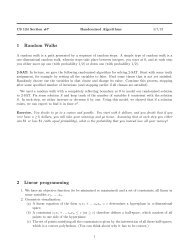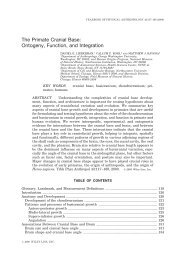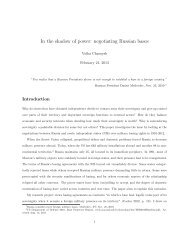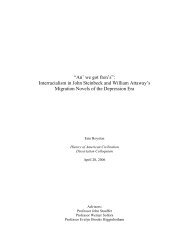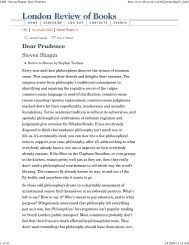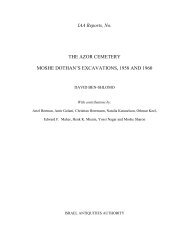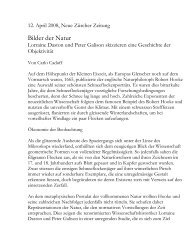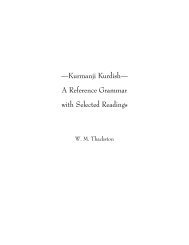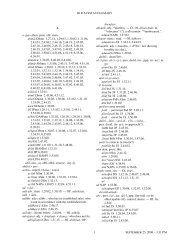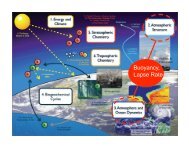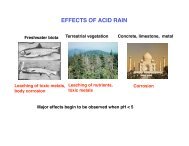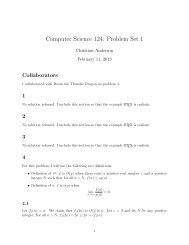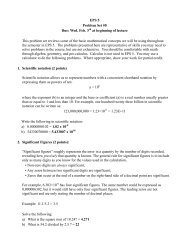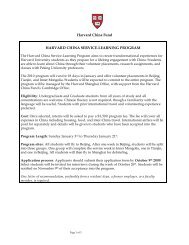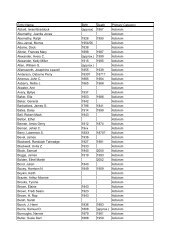—Kurmanji Kurdish— A Reference Grammar with Selected Readings
—Kurmanji Kurdish— A Reference Grammar with Selected Readings
—Kurmanji Kurdish— A Reference Grammar with Selected Readings
You also want an ePaper? Increase the reach of your titles
YUMPU automatically turns print PDFs into web optimized ePapers that Google loves.
Ez pê bawer bûm ku meriv ê bikaribûya,<br />
bi zimanê kurdî, romanek ava<br />
bikira.<br />
Ji rûniştevanên wê, mirov dê bigotaya<br />
Kurdistan e.<br />
I believed that one should be able to produce<br />
a novel in Kurdish.<br />
To judge by the inhabitants of it, one<br />
would say it was Kurdistan.<br />
Ew ê gelek nebaş bibûya. It would have been very bad.<br />
(4) After xwezî ‘would that, I wish’ or the verb xwiziyan ‘to wish’ for<br />
unfulfillable wishes in the past, often <strong>with</strong>out the bi- prefix.<br />
Ax, xwezî wî zanîbûya ez çiqasî bi vê<br />
peyvê diêşiyam.<br />
Xwiziya wî satila Nazî jî bi xwe re anî<br />
ba bo tijî av bike.<br />
THE VERB<br />
Oh, would that he had known how<br />
pained I was by those words.<br />
He wished he had brought Nazi’s bucket<br />
too to fill it <strong>with</strong> water.<br />
§ 26. The Passive Voice. The passive voice is constructed from the verb<br />
hatin (conjugated in all persons, moods, and tenses) plus the infinitive. Examples<br />
of the passive are the following conjugations of hatin dîtin ‘to be<br />
seen.’ For any other passive verb, simply substitute the infinitive for dîtin.<br />
PRESENT INDICATIVE PRESENT SUBJUNCTIVE<br />
‘I am seen, &c.’ ‘that I be seen, &c.’<br />
ez têm dîtin em tên dîtin ez bêm dîtin em bên dîtin<br />
tu têyî dîtin hun tên dîtin tu bêyî dîtin hun bên dîtin<br />
ew tê dîtin ew tên dîtin ew bê dîtin ew bên dîtin<br />
FUTURE SIMPLE PAST<br />
‘I will be seen, &c.’ ‘I was seen, &c.’<br />
ezê bêm dîtin emê bên dîtin ez hatim dîtin em hatin dîtin<br />
tê bêyî dîtin hunê bên dîtin tu hatî dîtin hun hatin dîtin<br />
ewê bê dîtin ewê bên dîtin ew hat dîtin ew hatin dîtin<br />
PRESENT PERFECT PAST PERFECT<br />
‘I have been seen, &c.’ ‘I had been seen, &c.’<br />
ez hatime dîtin em hatine dîtin ez hatibûm dîtin em hatibûn dîtin<br />
67



